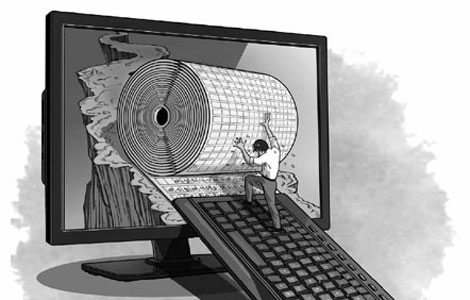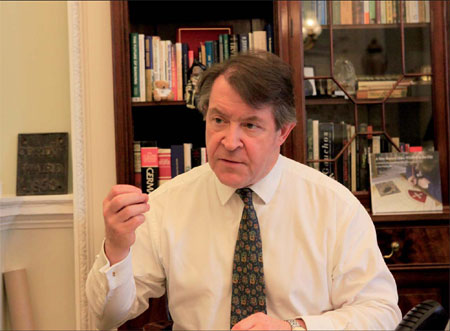Chinese rounding on Square Mile
Updated: 2013-10-11 09:54
By Cecily Liu and Qiu Bo (China Daily)
|
|||||||||||
City of London mayor looks forward to opportunities in new Shanghai FTZ
China's rapidly maturing financial services industry has brought the country increasingly closer to the City of London, the Square Mile's lord mayor Roger Gifford says.
Since Gifford took up his one-year appointment in November, China Construction Bank has issued a dim sum bond (denominated in Chinese currency) in London, a yuan swap line has been established between the central banks of Britain and China, China's Ping An Insurance has bought freehold to Lloyd's of London's office ... and the list of Chinese investment continues.
Such a picture is in sharp contrast to his memories of China in 1995 when he visited the country for the first time.
"It was very different back then," the 58-year-old lord mayor recalls. "When I first visited, the whole of Pudong (the CBD of Shanghai) was flat, but construction was already beginning."
China went on changing during Gifford's subsequent trips, in 1998, 2002, 2006, 2010 and again this year.
"Of course, China is now much more active, much more open and much more liberal," he says. "China grew steadily in the 80s, and then in the '90s you had this feeling of 'Wow, there is a huge power to grow'."
With each change, China's financial market also seems to be affording additional opportunities to companies in the City of London, Gifford says.
His visit to China this month has been fruitful, and he was particularly excited to talk to Shanghai's local government about the city's newly launched free trade zone and what it means to the City of London.
Officially opened on Sept 29, the China (Shanghai) Pilot Free Trade Zone is an initiative by the Chinese government to test economic and financial reform, and will be replicated across China if successful.
Spanning an area of nearly 28 square kilometers, the zone will help to upgrade financial services, promote trade, improve governance and encourage foreign investment in 18 sectors in the country's regulated service industry, the Chinese government says.
There are also plans to experiment with the convertibility of China's controlled currency, the yuan, and let market forces rather than regulators set interest rates.
Gifford says he is particularly interested in the increased liberalization of financial services in the zone, although it is too early to tell how it will help London's businesses because details of regulations have yet to be announced.
"If it allows more services, typical services which London produces, to be brought into China via this site, then that's interesting. So we bring the services - might be banking, might be law, might be accounting - and see what can be done," he says.
Gifford says he is especially keen to find out about what is permitted in the zone for bank financing and lending, and how that connects to the rest of China.
Banks setting up in this zone would want to extend their increased financing and lending capacity to activities outside the zone, which is otherwise limited, he says. "So how much can you lend, and in what way can you lend?"
Whatever the regulatory details, he supports the zone "because it will be under international rule, and it will allow more freedom of access and freedom of activity".
Another highlight of Gifford's China visit was attending the launching ceremony for the Shanghai office of London's bulk shipping exchange, the Baltic Exchange.
The exchange is already well known in China as the publisher of the daily Baltic Dry Index, which assesses the price of moving major raw materials by sea, and is used by many major Chinese commodity importers.
"The Baltic is the world's most reliable exchange. I think the opening of their Shanghai office is significant as it extends global maritime standards to China," he says.
It will also attract more Chinese shipping companies to join the exchange, helping them access global shipping markets more readily.
"To international shipping companies, it means greater facilitation, and greater knowledge, which helps people who want to buy and sell," he says. "It also helps the new Chinese members to be more international, as it acts as a mark of their quality."
Gifford also witnessed the expansion in China of the London Metal Exchange, which Hong Kong Exchanges and Clearing bought last year.
"(The acquisition) clearly means greater influence of Chinese companies on the London Metal Exchange, and that's great, because China is a major metal purchaser and seller," he says.
Gifford says an essential part of the Chinese financial industry's opening-up is the internationalization of the country's institutions, and having five Chinese banks gathered in London clearly represents progress.
"These banks learn a lot about international banking standards, which they can then bring back to China. This may relate to lending, credit cards, bond markets, foreign exchange, or whatever. So this process is one of harmonizing standards."
At the same time, he says, Chinese banks also contribute a lot to London, through employment and tax, as well as helping to facilitate bilateral trade and investment between China and the UK.
They also help London's efforts to develop an offshore yuan market through educating businesses about how they can invoice trade transactions in the Chinese currency.
London's efforts to develop an offshore yuan market began in 2011 when the then Chinese vice-premier Wang Qishan had welcomed private-sector initiatives for such a market during his meetings with British Chancellor George Osborne.
Since then, Chinese and international banks have developed a range of yuan products in London, and the city's yuan liquidity has grown quickly. To strengthen activities, the Chinese and UK central banks established a yuan swap line in June.
Gifford says much progress is visible in London's yuan development, but it is crucial to build up public awareness and the practice of invoicing in yuan for trade.
"People have to learn that they can invoice in another currency," he says. "The Chinese banks play an active role in telling companies how to invoice in the yuan."
He says this education is greatly needed in medium-to-large sized businesses that are big enough to do trade with China but not big enough to fully appreciate the benefits of invoicing in yuan.
"We are actively working with corporates to persuade them," Gifford says of his team at the City of London. "We have programs and information we send to them to help them understand."
Gifford was born in St Andrews in Scotland in 1955. After graduating from Oxford, he joined the investment bank SG Warburg in 1978, and in 1982 joined the Swedish financial group Skandinaviska Enskilda Bank, becoming its UK country manager in 2000.
It was Gifford's role at SEB that first took him to China, where the bank only had a representative office.
He remarks that China's financial landscape is very different now, although further reform is yet to come.
"(China's speed of reform) is certainly reasonable, and therefore because it is reasonable, it is right. We would encourage it to come quickly, but if it comes too quickly it can produce mistakes," Gifford warns.
"It's a procedure which will take many years. As China grows, China will have an interest to bring in foreign investors and businesses. This will be easier if standards are the same."
Contact the writers at cecily.liu@chinadaily.com.cn
|
Roger Gifford has been a regular visitor to China since 1998. Qiu Bo / China Daily |
(China Daily European Weekly 10/11/2013 page20)
Today's Top News
Senate leader 'confident' fiscal crisis can be averted
Riding the wave of buy-ups
Working group to discuss sea issues
Chinese firm joins UK airport enterprise
Disaster response gets a helping hand
Have yuan, will travel far and wide
Draft regulation raises fines for polluters
Communities give care for elderly
Hot Topics
Lunar probe , China growth forecasts, Emission rules get tougher, China seen through 'colored lens', International board,
Editor's Picks

|

|

|

|

|

|






